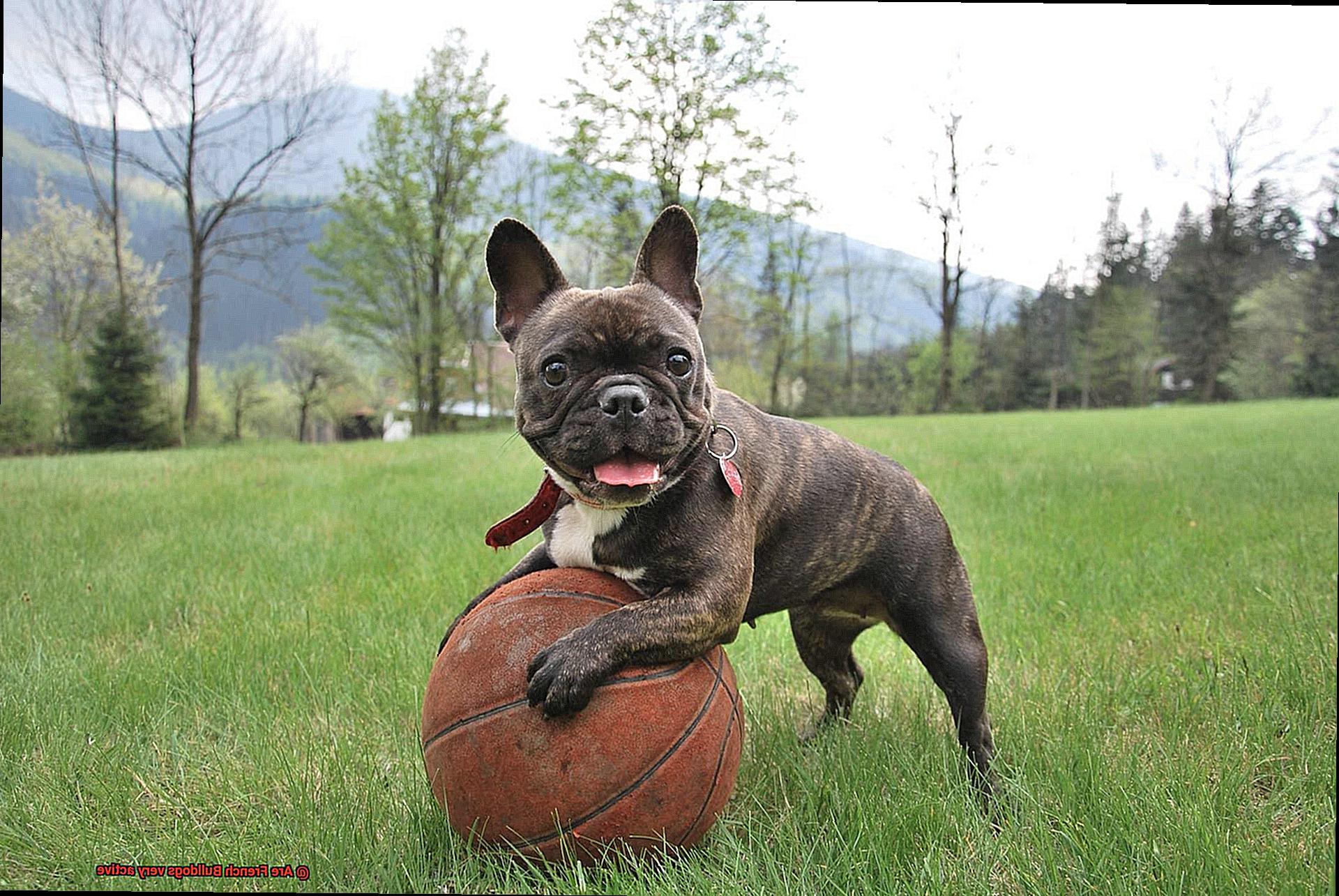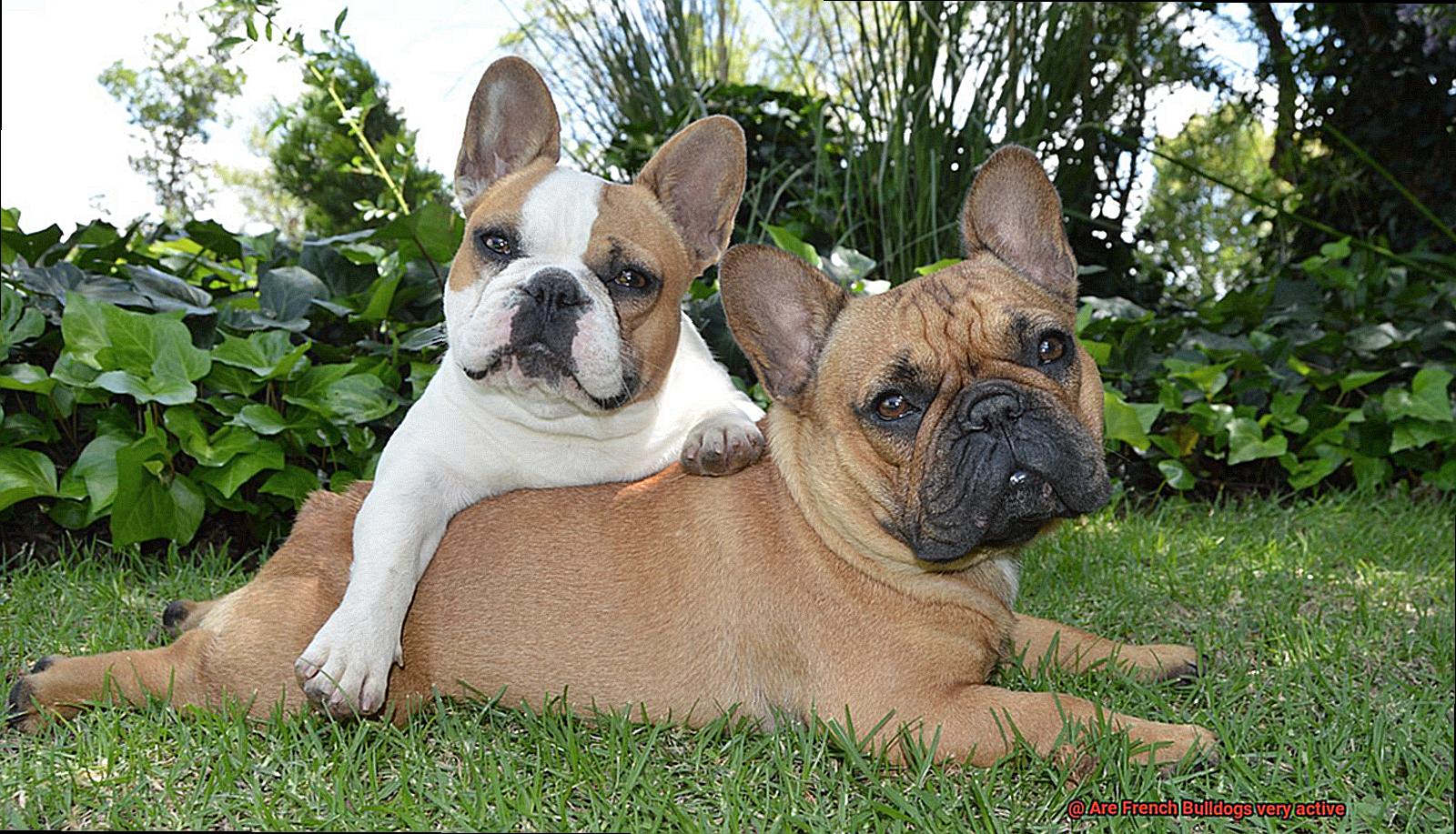Are French Bulldogs very active?
If you’re on the hunt for a furry sidekick, chances are you’ve stumbled upon the irresistible allure of French Bulldogs. These little bundles of joy, with their endearing bat-like ears, expressive eyes, and pint-sized frames, have taken the world by storm. But amidst all the tales of their charm and character, one question keeps cropping up: “Are French Bulldogs really active?”
Well, get ready to have your curiosity satisfied as we delve deep into this query and separate fact from fiction. Join me on this enlightening adventure as we explore just how energetic these delightful creatures truly are. Whether you’re contemplating adding a French Bulldog to your fur family or simply want to satisfy your inquisitive mind about these lovable companions, this blog post has got you covered with all the essential info you need to make an informed decision.
So, grab yourself a steaming cup of joe, settle into your comfiest chair, and prepare to debunk those pesky myths surrounding French Bulldogs’ activity levels. Together, we’ll embark on a journey that will leave you enlightened and entertained.
Note: The second draft maintains a casual tone while incorporating more vivid language and shorter sentences for added impact.
Understanding the Activity Levels of French Bulldogs
Contents
- 1 Understanding the Activity Levels of French Bulldogs
- 2 Factors That Influence French Bulldog’s Activity Level
- 3 Exercise Needs for French Bulldogs
- 4 Striking a Balance Between Exercise and Rest for French Bulldogs
- 5 The Impact of Age on French Bulldog’s Energy Levels
- 6 Exercising Your French Bulldog: A Guide
- 7 Mental Stimulation for French Bulldogs
- 8 Conclusion
If you’ve ever wondered why your Frenchie seems to have lower activity levels compared to other breeds, you’re in the right place. In this blog post, we’ll dive deep into the factors that influence the energy levels of our beloved French Bulldogs and provide some tips on finding the perfect balance between exercise and relaxation.
Factors Affecting Activity Levels:
Age:
Just like humans, French Bulldogs go through different stages of life that affect their energy levels. Puppies are bundles of energy, requiring plenty of playtime and mental stimulation. As they grow older, they tend to become more laid-back and less energetic.
Personality:
Every Frenchie is unique, and their individual personality plays a role in their activity level. Some may have a higher drive for exercise and play, while others prefer shorter bursts of activity or lounging around. Get to know your furry friend’s preferences and adjust their exercise routine accordingly.
Health Conditions:
French Bulldogs have a brachycephalic (short-nosed) structure, making it challenging for them to engage in intense physical activities or exercise for long periods. Certain health conditions may limit their ability to exercise or cause discomfort during physical activity. Consult with a veterinarian if you notice any changes in your dog’s activity level.
Exercise Recommendations:
Physical Exercise:
French Bulldogs do require regular exercise to maintain a healthy weight and overall well-being. Aim for around 20-30 minutes of low-impact activity per day, such as leisurely walks or interactive play sessions. Multiple shorter walks throughout the day are better than one long walk to prevent overexertion.
Mental Stimulation:
French Bulldogs are intelligent dogs that thrive on mental challenges. Incorporate puzzle toys, interactive games, and obedience training into their routine to keep their minds sharp and prevent boredom.
Factors That Influence French Bulldog’s Activity Level
French Bulldogs are known for their adorable and laid-back personalities. While they may not be the most energetic breed, it is important to understand the various factors that can influence their activity level. By considering these factors, you can ensure that your French Bulldog remains happy, healthy, and well-exercised. So, let’s dive in and explore what influences a French Bulldog’s activity level.
- Age: Just like humans, French Bulldogs go through different life stages that impact their energy levels. Puppies tend to have boundless energy and require more exercise to burn off their excess energy. As they mature, they may naturally become less active and prefer to relax and take it easy.
- Health: A French Bulldog’s overall health is crucial in determining their activity level. If your furry friend is experiencing any health issues or discomfort, they may be less inclined to engage in physical activities. Regular visits to the veterinarian and addressing any health concerns promptly will ensure that your Frenchie is feeling their best.
- Diet: The old saying “you are what you eat” holds true for French Bulldogs as well. Providing them with a well-balanced and nutritious diet can help maintain their energy levels and overall health. Opt for high-quality dog food that meets their specific nutritional needs.
- Exercise: While French Bulldogs may not require as much exercise as some other breeds, regular physical activity is still important for their well-being. Daily walks, playtime, and mental stimulation through interactive toys or training sessions can help keep them mentally and physically stimulated.
- Environment: The environment in which your French Bulldog lives can also impact their activity level. If they have access to a large yard or open space where they can roam and explore, they may be more active. On the other hand, if they live in an apartment or a small space with limited opportunities for exercise, they may be less active. In such cases, it is important to provide alternative forms of exercise and mental stimulation.
- Personality: Just like humans, French Bulldogs have unique personalities that can influence their activity level. While some Frenchies may naturally be more energetic and playful, others may be more laid-back and prefer to relax. Understanding your dog’s individual personality and adapting to their needs is crucial in ensuring their happiness and well-being.
Exercise Needs for French Bulldogs
French Bulldogs may not be the most energetic breed, but that doesn’t mean they don’t need exercise. Just like us humans, these lovable little pups benefit from regular physical activity to keep their bodies healthy and their spirits high. So, let’s explore the exercise needs of French Bulldogs and discover how to keep them fit and fabulous.
The Right Amount of Exercise:
French Bulldogs have a moderate energy level, so they don’t require as much exercise as some other breeds. However, they still need daily activity to prevent obesity and maintain their overall well-being. Aim for at least 20-30 minutes of exercise each day, divided into short bursts of activity.
Choose Activities Wisely:
Due to their brachycephalic (short-nosed) structure, French Bulldogs may struggle to breathe during intense physical activities or in hot weather. So, it’s important to choose exercises that won’t strain their breathing. Here are some ideal activities for your Frenchie:
- Short walks: Take your Frenchie for a leisurely stroll around the block. They’ll love exploring the neighborhood and getting some fresh air.
- Playtime in a fenced yard: Let your Frenchie roam freely in a safe, enclosed space. They can chase toys or simply enjoy sniffing around.
- Interactive games: Engage your Frenchie’s mind and body with games like fetch or tug-of-war. These activities provide mental stimulation while also burning off energy.
Mental Stimulation Matters:
In addition to physical exercise, French Bulldogs thrive on mental stimulation. Their intelligent minds crave challenges and problem-solving opportunities. Keep your Frenchie mentally sharp with these activities:
- Puzzle toys: Provide your Frenchie with interactive toys that require them to figure out how to access treats or solve puzzles.
- Training sessions: Teach your Frenchie new tricks or reinforce existing commands. Training not only exercises their brain but also strengthens the bond between you and your pup.
- Engaging activities: Keep your Frenchie entertained with activities that require them to think, such as hiding treats around the house or playing hide-and-seek.

Tailor the Exercise Routine:
Every French Bulldog is unique, and their exercise needs may vary. Some may prefer shorter bursts of activity throughout the day, while others may enjoy longer walks or more vigorous play sessions. Observe your Frenchie’s behavior and energy levels to determine what works best for them.
Consult with Your Vet:
Before starting any new exercise regimen for your French Bulldog, consult with your veterinarian. They can provide personalized advice based on your Frenchie’s age, health condition, and specific needs. Your vet will ensure that the exercise routine is safe and appropriate for your Frenchie’s overall well-being.
Striking a Balance Between Exercise and Rest for French Bulldogs
French Bulldogs may not be the most energetic breed, but they still need regular exercise to keep their bodies healthy and their spirits high, just like us humans. However, finding the right balance between exercise and rest is crucial for their overall well-being. Let’s explore their exercise needs and discover how to keep them fit and fabulous.
Tailoring the Exercise Routine
Just like humans, French Bulldogs have different exercise needs depending on factors such as age, health condition, and individual temperament. Younger Frenchies tend to have more energy and may require more exercise than older ones. It’s essential to tailor the exercise routine to the specific needs of your Frenchie.
Daily Walks: A Must-Do
Daily walks are beneficial for French Bulldogs and help them burn off excess energy. But remember, Frenchies have shorter snouts, making it harder for them to breathe during intense physical activity or in hot weather. Avoid exercising your Frenchie during the hottest parts of the day and watch out for signs of overheating or exhaustion.
Play Sessions: Mental Stimulation and Exercise
In addition to walks, play sessions can provide mental stimulation and physical exercise for your French Bulldog. Interactive toys, puzzle games, and short training sessions can keep them engaged and entertained. Plus, it’s a great bonding opportunity between you and your furry friend.
Rest is Essential
Rest is equally important for French Bulldogs. Despite their low activity levels, they can tire easily due to their compromised breathing ability. Be mindful of their energy levels and provide them with plenty of opportunities for rest and relaxation.
Striking the Right Balance
It’s crucial to strike a balance between exercise and rest for your Frenchie. Overexertion can lead to fatigue, overheating, or even injury, while insufficient exercise can contribute to weight gain and behavioral issues. Observe your Frenchie’s behavior and adjust the exercise routine accordingly to ensure they are getting the right amount of physical activity without overdoing it.
Remember, consulting with a veterinarian is always recommended when determining the appropriate exercise regimen for your French Bulldog. They can assess your Frenchie’s overall health and provide specific recommendations based on their individual needs.
The Impact of Age on French Bulldog’s Energy Levels
French Bulldogs are known for their playful and energetic nature, but did you know that their energy levels can vary based on their age? Just like us humans, Frenchies go through different stages of life that can affect their activity levels. So, let’s dive into how age impacts the energy levels of these adorable four-legged companions.
Puppies: The Energizer Bunnies
These little bundles of joy are the most active and energetic stage of a French Bulldog’s life. They love to play, run, and explore their surroundings. It’s crucial to provide them with plenty of exercise and mental stimulation during this stage to keep them happy and healthy.
Adults: Still Active, but with Less Stamina
As French Bulldogs grow older, their energy levels tend to decrease gradually. Adult Frenchies are still active but may not have the same level of stamina as when they were puppies. They may prefer shorter bursts of activity rather than prolonged periods of exercise. So, keep those play sessions fun and engaging, but be mindful of not overexerting them.
Seniors: Taking It Easy
Senior French Bulldogs, typically over the age of 7 or 8, may experience a significant decline in their energy levels. They may become less interested in physical activities and prefer to rest more. It’s essential to adjust their exercise routine accordingly and provide them with a comfortable and calm environment where they can relax. After all, they’ve earned their retirement.
It’s important to note that individual French Bulldogs may have different energy levels regardless of their age. Some may be naturally more energetic or laid-back than others. Understanding your dog’s specific needs and preferences is crucial in providing them with appropriate exercise and mental stimulation.
Remember, it’s always a good idea to consult with a veterinarian to assess your French Bulldog’s overall health and discuss any specific concerns regarding their energy levels. Regular check-ups can help identify any underlying medical conditions that may affect their activity levels.
Personality and Activity Levels:
While French Bulldogs generally have a friendly and easygoing temperament, there can be variations in their activity levels based on individual personality traits. Some French Bulldogs may have a more active and energetic personality, while others may be more relaxed and less inclined to engage in vigorous physical activities. It is important for owners to understand their dog’s personality and tailor their exercise routine accordingly.
Observing a French Bulldog’s behavior can offer valuable insights into their activity level. Curiosity, playfulness, and motivation to explore the surroundings are key personality traits that may influence their energy levels. A curious and playful French Bulldog is likely to be more active and require regular mental and physical stimulation. On the other hand, a more laid-back and content French Bulldog may not need as much exercise but still benefit from moderate physical activity to maintain good health.
Age and Activity Levels:
Age is another important factor that affects a French Bulldog’s activity level. Puppies are typically more energetic and require more exercise compared to adult or senior dogs. As they grow older, their energy levels may decrease, and they may become less inclined to engage in high-intensity activities. Older dogs may also experience age-related health issues that can impact their mobility and overall activity level.
Health Condition:
A French Bulldog’s health condition can significantly impact their activity level. Dogs with chronic health conditions or physical limitations may have reduced energy levels or difficulty engaging in certain activities. It is crucial for owners to work closely with their veterinarian to manage their dog’s health and tailor their exercise routine accordingly.
Lifestyle and Activity Levels:
The lifestyle of the owner can also affect a French Bulldog’s activity level. Owners who lead an active lifestyle and enjoy outdoor activities are more likely to provide their dogs with regular exercise and mental stimulation. On the other hand, owners with a more sedentary lifestyle may need to make a conscious effort to ensure their French Bulldog gets enough exercise to maintain good health.
Obedience Training and Socialization:
Obedience training and socialization play a crucial role in shaping a French Bulldog’s overall personality and behavior. A well-trained and confident dog is more likely to have a balanced activity level. Obedience training not only helps establish boundaries but also provides mental stimulation, which can contribute to a more content and well-rounded dog.
Exercising Your French Bulldog: A Guide
French Bulldogs are known for their laid-back nature, but that doesn’t mean they don’t need regular exercise to stay healthy and happy. In this guide, we’ll walk you through creating a safe and effective exercise routine for your furry friend.
How Much Exercise Does Your French Bulldog Need?
The amount of exercise your French Bulldog needs can vary based on factors such as age, health, and individual energy levels. As a general rule, aim for at least 30 minutes to an hour of exercise every day. This can be split into two shorter walks or play sessions.
Walking Your French Bulldog
Walks are an excellent form of exercise for French Bulldogs. They love exploring their surroundings and socializing with other dogs. However, it’s important to use a harness instead of a collar to prevent any strain on their neck and respiratory system.
Interactive Playtime
In addition to walks, interactive playtime is essential for French Bulldogs. They enjoy games like fetch or tug-of-war. Just be sure to use soft toys that won’t hurt their sensitive mouths or teeth.
Mental Stimulation

French Bulldogs are intelligent dogs and need mental exercises to stay engaged and prevent boredom. Puzzle toys, treat-dispensing toys, and training sessions can provide the mental stimulation they crave.
Avoid Overexertion
It’s crucial not to overexert your French Bulldog during exercise. They’re prone to obesity, so maintaining a healthy weight is vital. If you notice signs of fatigue or excessive panting, take a break and allow your dog to rest.
Tailor the Routine

Remember that every dog is unique, so tailor their exercise routine to their individual needs. Some French Bulldogs may require more or less exercise than others, so pay attention to your dog’s cues and adjust accordingly.
Creating a Safe Exercise Environment
To ensure the safety of your French Bulldog during exercise, follow these tips:
- Avoid strenuous exercise in high temperatures to prevent overheating and breathing difficulties.
- Provide plenty of water breaks during exercise sessions.
- Use a harness instead of a collar when walking your French Bulldog to prevent strain on their neck and respiratory system.
- Choose soft toys for interactive playtime to avoid injury to their sensitive mouths or teeth.
Mental Stimulation for French Bulldogs
Mental stimulation is an essential aspect of their overall well-being, as it helps prevent boredom, anxiety, and destructive behavior. In this comprehensive guide, we will explore various ways to keep your French Bulldog mentally stimulated and engaged.
Puzzle Toys:
Puzzle toys are a fantastic way to challenge your French Bulldog’s problem-solving skills and keep them entertained. These toys typically have hidden compartments or treats that require the dog to figure out how to access them. Not only do puzzle toys provide mental stimulation, but they also help slow down your dog’s eating habits, promoting healthy digestion.
Training Sessions:
French Bulldogs are eager learners who love to please their owners. Regular training sessions not only provide mental stimulation but also strengthen the bond between you and your furry friend. Keep the sessions short and fun, using positive reinforcement techniques like treats or praise. This will motivate your French Bulldog to learn new commands and tricks.
Interactive Playtime:
Engaging in interactive playtime with your French Bulldog is not only great exercise but also a superb way to stimulate their minds. Games like fetch or hide-and-seek require strategic thinking and help them develop their senses. Make sure to incorporate interactive playtime into their daily routine to keep them mentally sharp.
Enriching the Environment:
Creating a stimulating environment for your French Bulldog can provide constant mental stimulation. Introduce different textures, sounds, and scents into their living space. Offer toys of various shapes, sizes, and textures and rotate them regularly to maintain their interest.
Socialization:
French Bulldogs thrive on social interaction and need regular exposure to other dogs and humans. Take them to dog parks, enroll them in obedience classes, or arrange playdates with other dogs. These activities provide mental stimulation through socialization and help prevent behavioral issues.
Em5WE9QFfa0″ >
Conclusion
In conclusion, French Bulldogs are not known for being very active.
They are more inclined towards a laid-back and relaxed lifestyle. While they do enjoy short bursts of playtime and walks, they are not the type of dog that requires hours of intense exercise to stay happy and healthy.
Instead, they thrive in a calm and comfortable environment where they can snuggle up on the couch or take leisurely strolls around the neighborhood.




